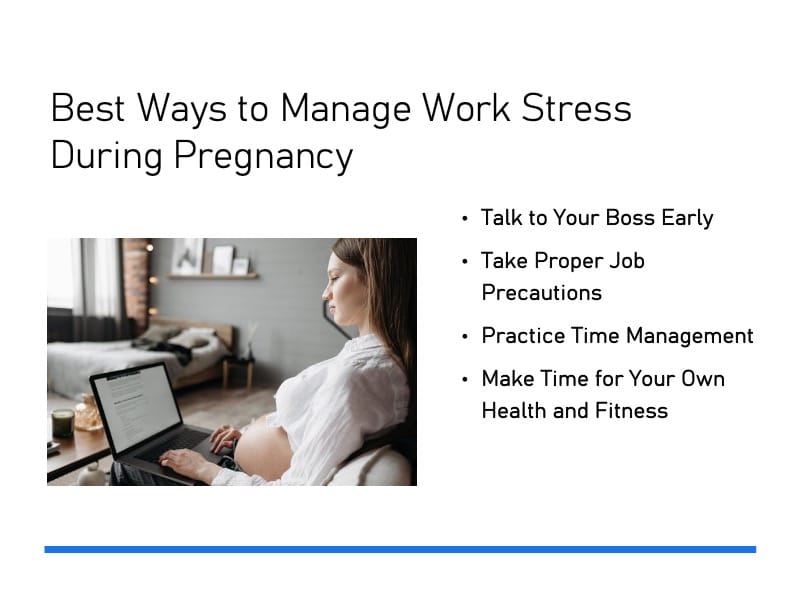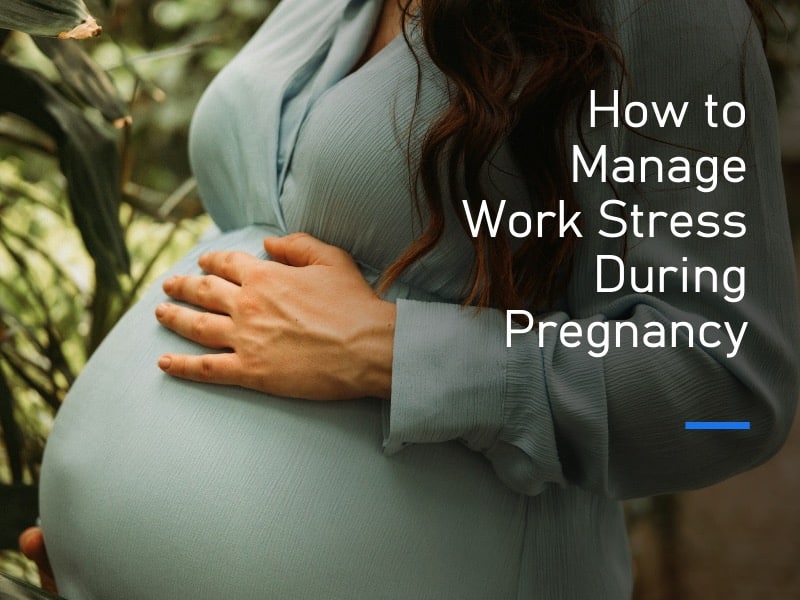How to Manage Work Stress During Pregnancy
Learning how to manage work stress during pregnancy is essential for protecting both maternal health and fetal development.
Chronic stress during this time has been linked to increased risks of high blood pressure, preterm labor, and low birth weight, making it a serious concern for expectant mothers working in demanding environments (Lobel et al., 1992).
Hormonal shifts, physical changes, and emotional fluctuations can heighten sensitivity to workplace demands, leaving many women feeling overwhelmed or unsupported.
Fortunately, with the right strategies, such as setting boundaries, advocating for accommodations, and improving time management, pregnant individuals can maintain career productivity while prioritizing wellness.
By understanding the physiological and psychological effects of stress during pregnancy, you’ll be better equipped to manage work stress during pregnancy with confidence and clarity.
Risks of Too Much Work Stress During Pregnancy
Excessive work-related stress during pregnancy can lead to significant health consequences for both the mother and the developing baby.
Persistent stress activates the hypothalamic-pituitary-adrenal (HPA) axis, increasing cortisol levels, which can interfere with fetal development and contribute to complications such as low birth weight, preeclampsia, and preterm birth (Glynn et al., 2008).
Mental health risks are also a concern.
Pregnant employees experiencing chronic stress (especially chronic workplace stress) are at a greater risk for prenatal anxiety and depression, which can negatively impact maternal-infant bonding and postpartum recovery.
Fatigue, disrupted sleep, poor appetite, and mood instability may all intensify if workplace pressure is left unaddressed.
Occupational stress can also influence labor outcomes.
Research shows that high psychosocial stress is linked with a greater need for medical interventions during delivery, including cesarean sections or vacuum extraction, which come with additional risks for both mother and baby (Wadhwa et al., 2011).
For those in physically demanding jobs or high-responsibility roles, the combination of physical strain and emotional stress can amplify the likelihood of miscarriage or gestational complications.
That’s why it’s critical to monitor symptoms, seek workplace accommodations, and proactively manage work stress during pregnancy.
Best Ways to Manage Work Stress During Pregnancy

Managing stress during pregnancy isn’t just about protecting your mental well-being; it’s about creating the healthiest environment possible for you and your baby.
This stage of life presents new physical and emotional challenges, which can be exacerbated by workplace demands, deadlines, or a lack of support.
That’s why it’s essential to learn to relax and not worry about things outside your control, while taking proactive steps to build resilience at work.
From time-saving habits to natural remedies for stress, expectant mothers can find effective, healthy ways to battle burnout from work.
With the right support systems and tools, you’ll understand how to stress less without sacrificing your career or your health.
Talk to Your Boss Early
If you’re employed, you’d want to alert your boss early about your condition so they can adjust their policies in your favor during this period.
A great boss will strive to create a stress-free environment by creating a safe and healthy work environment for you and your unborn child.
By talking to them early, you can help them understand your concerns so they can make the right changes needed for your comfortable experience during pregnancy.
You can request to be relocated to a safe and protected space, such as an enclosed office with ergonomic furniture, if the company has an open-floor-plan office.
The discussion could also include requesting flexible working arrangements, such as working from home when you’re nearing your due date.
Also, discuss how you can attend prenatal appointments without compromising your work schedule for the benefit of everyone.
Take Proper Job Precautions
Some working conditions can increase stress levels and the risk of complications during pregnancy and birth, leading to even bigger challenges like vacuum extraction delivery complications.
If a pregnant woman is exposed to continuous stress, they may end up having a complicated delivery process, prompting the use of vacuum extraction for safe delivery.
However, vacuum extraction also comes with its risks, which may lead to further complications for the baby and mother that could be easily avoided at the work level.
You should adhere to your doctor’s health advice and avoid stressful working conditions that expose you to stress.
If your job involves prolonged standing, heavy lifting, and excessive noise, you’re most likely to suffer stress.
Take the necessary precautions to protect yourself and the baby.
Practice Time Management
Whether you’re the CEO or an employee, effective time management during pregnancy is crucial for the avoidance of work-related stress.
As your pregnancy progresses, you’re likely to experience heightened nausea, fatigue, and other symptoms that can inhibit your ability to perform effectively at work.
By prioritizing your work, you can manage your time wisely, finishing tasks on time and reducing stress.
Some effective time management tips you can borrow include:
- Delegating tasks: Your colleagues or juniors can be of great help during this phase of your life. You can assign them tasks that you’re unable to handle on time, so that every important and urgent task is completed on time.
- Prioritizing tasks: Handle important and urgent tasks fast to relieve yourself of deadline-related stress.
- Set clear boundaries: Setting boundaries can help protect you from strain and stress. Know when to say no to additional work that can keep you straining long work hours, which can add to your pregnancy stress.
Make Time for Your Own Health and Fitness
Prioritizing your own health and fitness during pregnancy is one of the most effective ways to reduce workplace stress and support long-term well-being.
Regular physical activity, such as walking, stretching, or light strength training, can improve circulation, reduce swelling, increase energy levels, and regulate mood by releasing endorphins.
These benefits are especially important for working mothers who must balance physical changes with their job responsibilities.
Specifically, pelvic floor exercises, including Kegels, are essential for maintaining core stability and preventing common pregnancy-related issues like incontinence or pelvic pain.
Strengthening these muscles also supports a smoother labor and recovery process.
Breathing exercises and mindfulness-based techniques, such as those used in the Bradley Method of natural childbirth, help reduce anxiety, improve body awareness, and prepare the mind for labor by reinforcing relaxation and calmness.
Incorporating gentle daily movement and functional fitness practices can also contribute to easier postpartum recovery.
Women who stay consistent with safe prenatal fitness routines often experience less physical discomfort during pregnancy and may find it easier to manage postpartum weight loss, improve sleep quality, and reduce the risk of postpartum depression (Nascimento et al., 2012).
Even with a busy work schedule, making time for low-impact exercise or mindful movement is a powerful way to protect your body, reduce mental tension, and feel more in control throughout your pregnancy journey.
Final Thoughts: Keys to Managing Work Stress During Pregnancy

Managing work stress during pregnancy is essential because excessive stress can increase the risk of complications such as premature birth, low birth weight, and birth trauma, all of which can affect a baby’s lifelong health.
Prioritizing rest and balanced workloads helps protect both maternal well-being and the baby’s developing nervous system from avoidable stress-related harm.
Although you may not be able to eliminate every source of workplace stress during pregnancy, you can take meaningful steps to reduce its impact.
Open communication with your employer, strategic time management, and supportive adjustments to your workload can all contribute to a healthier work environment.
Collaborating with colleagues and supervisors helps ensure that your unique needs during pregnancy are respected and accommodated.
By applying evidence-based strategies and prioritizing both physical and emotional well-being, you can navigate this critical life stage with greater ease.
Ultimately, managing work stress during pregnancy supports not just your productivity, but the long-term health of both you and your baby.
This website does not provide medical advice. This website site does contain affiliate links, and purchases may earn a commission.
Read my Medical Disclaimer, Review Disclaimer, and Publishing Policies for more details. Use of this site indicates acceptance of these terms.



